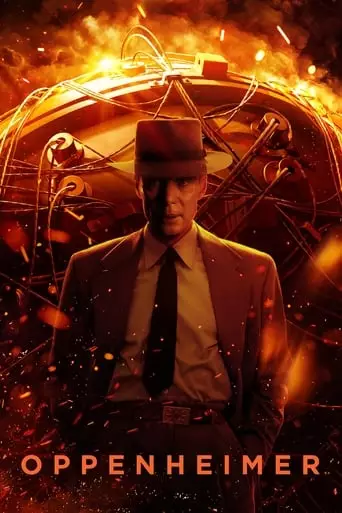
Oppenheimer (2023) Watch Online Free
The story of J. Robert Oppenheimer’s role in the development of the atomic bomb during World War II.
Christopher Nolan’s Oppenheimer (2023) delves into the complex, harrowing life of J. Robert Oppenheimer, the physicist at the heart of the Manhattan Project who is known as the “father of the atomic bomb.” The film offers a vivid portrayal of Oppenheimer’s inner turmoil, ethical dilemmas, and the far-reaching consequences of his creation. With Cillian Murphy delivering a standout performance as the conflicted physicist, the film is both a biographical exploration and a meditation on the moral complexities of scientific advancement.
The narrative of Oppenheimer is structured around multiple timelines, with Nolan’s trademark non-linear storytelling. We begin with Oppenheimer’s early life, focusing on his academic rise and his eventual recruitment to lead the Manhattan Project in the 1940s. This secretive project was tasked with developing nuclear weapons before Nazi Germany could. As Oppenheimer grapples with the weight of his responsibility, the film shows his inner struggle, particularly as he witnesses the first successful atomic test.
However, the devastation caused by the bombings of Hiroshima and Nagasaki in 1945 leads Oppenheimer to question his role in unleashing such destructive power. His post-war years are filled with moral conflict as he becomes an outspoken critic of further nuclear weapons development, especially the hydrogen bomb. His stance, combined with Cold War tensions, leads to his political downfall.
Nolan’s direction is impeccable, blending personal drama with historical events. The film’s timeline is fragmented, constantly shifting between past and present to reflect Oppenheimer’s tumultuous journey. The use of color and black-and-white sequences is not just an aesthetic choice but a way of differentiating between the subjective experiences of Oppenheimer and the objective historical accounts of his life. The film also makes use of surreal, almost psychedelic imagery, representing Oppenheimer’s inner thoughts and the consequences of his nuclear discoveries
The technical aspects of Oppenheimer elevate the film to an exceptional level. Hoyte van Hoytema’s cinematography captures both the awe-inspiring moments of scientific discovery and the terror of nuclear destruction. Ludwig Göransson’s score, filled with tension and urgency, perfectly complements the mood, while the sound design intensifies the emotional impact of the film’s key moments
After watching Oppenheimer, expect a whirlwind of emotions. The film is intellectually stimulating and emotionally intense, offering a profound reflection on the human condition. You may feel disturbed and deeply unsettled, particularly during the scenes of the atomic bomb’s detonation and the subsequent devastation. The emotional weight of Oppenheimer’s guilt, combined with the moral questions surrounding his creation, will linger long after the credits roll.
Moreover, the film’s exploration of the personal cost of scientific progress will likely leave you reflecting on the broader implications of technological advancements. Nolan’s vivid portrayal of Oppenheimer’s internal conflict might evoke a mixture of sympathy and sorrow, as you witness the toll his discoveries took on his psyche.
In essence, Oppenheimer is a cinematic experience that is both intellectually challenging and emotionally harrowing. It invites viewers to question the role of science in shaping the future, while also grappling with the personal and societal consequences of one man’s creation. If you’re looking for a movie that will make you think, feel, and reflect on the past’s influence on the present, Oppenheimer is an essential watch
